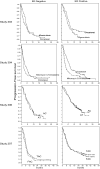Estrogen receptor expression and docetaxel efficacy in patients with metastatic breast cancer: a pooled analysis of four randomized trials
- PMID: 20421265
- PMCID: PMC3227977
- DOI: 10.1634/theoncologist.2009-0150
Estrogen receptor expression and docetaxel efficacy in patients with metastatic breast cancer: a pooled analysis of four randomized trials
Abstract
Background: Differences in the efficacy of various chemotherapies in patients with estrogen receptor (ER)(+) metastatic breast cancer are not well understood. In the present study, we assessed the efficacy of docetaxel in patients with metastatic breast cancer according to ER expression.
Methods: The efficacy of docetaxel in terms of the response rate and progression-free survival (PFS) time was analyzed according to ER expression in four randomized trials comparing a docetaxel-based regimen with a nontaxane regimen that included a total of 1,631 patients. The odds ratio for tumor response was estimated with logistic regression and a hazard ratio (HR) for PFS was estimated with Cox proportional hazards models.
Findings: ER expression was assessable in 1,037 patients included in these trials (64%). ER was expressed in 601 tumors (58%). Docetaxel was associated with a similarly higher response rate in both patients with ER(+) (odds ratio, 2.90; 95% confidence interval [CI], 1.72-4.87) and patients with ER(-) (odds ratio, 2.55; 95% CI, 1.44-4.51) disease. The lower hazard for disease progression with docetaxel was also similar in ER(+) (HR, 0.82; 95% CI, 0.67-1.00) and ER(-) (HR, 0.86; 95% CI, 0.70-1.07) cancers. The effect of docetaxel was not different in ER(+) and ER(-) disease, in terms of both the response rate and PFS time (interaction test, p = .77 and p = .93).
Interpretation: Docetaxel produces a higher response rate and lower risk for disease progression to a statistically similar extent in both patients with ER(+) and patients with ER(-) metastatic breast cancer.
Conflict of interest statement
The content of this article has been reviewed by independent peer reviewers to ensure that it is balanced, objective, and free from commercial bias. No financial relationships relevant to the content of this article have been disclosed by the independent peer reviewers.
Figures
References
-
- Andre F, Slimane K, Bachelot T, et al. Breast cancer with synchronous metastases: Trends in survival during a 14-year period. J Clin Oncol. 2004;22:3302–3308. - PubMed
-
- Valero V, Hortobagyi GN. Are anthracycline-taxane regimens the new standard of care in the treatment of metastatic breast cancer? J Clin Oncol. 2003;21:959–962. - PubMed
-
- Lebwohl DE, Canetta R. New developments in chemotherapy of advanced breast cancer. Ann Oncol. 1999;10(suppl 6):139–146. - PubMed
-
- Bonneterre J, Thurlimann B, Robertson JF, et al. Anastrozole versus tamoxifen as first-line therapy for advanced breast cancer in 668 postmenopausal women: Results of the Tamoxifen or Arimidex Randomized Group Efficacy and Tolerability study. J Clin Oncol. 2000;18:3748–3757. - PubMed
-
- Mouridsen H, Gershanovich M, Sun Y, et al. Phase III study of letrozole versus tamoxifen as first-line therapy of advanced breast cancer in postmenopausal women: Analysis of survival and update of efficacy from the International Letrozole Breast Cancer Group. J Clin Oncol. 2003;21:2101–2109. - PubMed
Publication types
MeSH terms
Substances
LinkOut - more resources
Full Text Sources
Medical
Miscellaneous


